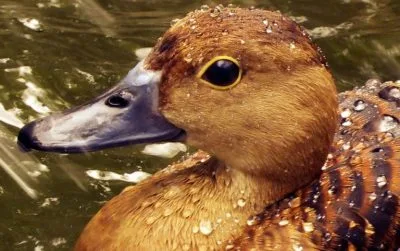No products in the cart.
Ducks
Duck Lifespan: How Long Do Ducks Live? (NOT all the Same)
Ducks, as well as swans, and geese, belong to a large family of Anatidae, or the biological water bird family.
While geese can live up to two decades, wild ducks have a shorter lifespan. So, how long do ducks live in different environments and across breeds?
In this post, we are going to discuss the average lifespan of ducks and the factors that can affect their lifespan.
*This post may have affiliate links, which means I may receive commissions if you choose to purchase through links I provide (at no extra cost to you). As an Amazon Associate I earn from qualifying purchases. Please read my disclaimer for additional details.
How Long Do Ducks Live On Average?
Both domestic and wild ducks can live 5 to 10 years on average. The healthier and better they are taken care of, the longer they will live.
And generally speaking, larger duck breeds have a shorter lifespan than smaller ones.
Beyond breeds, the average lifespan of a duck also depends on many factors including nutrition, housing, the number of eggs laid, general well-being, and their environment.
Domestic ducks often live longer than wild ducks because they are fed a well-balanced, nutritious diet and live in a safe, comfortable environment.
On the other hand, wild ducks have a shorter life expectancy.
For example, sea ducks can live 7 years because of high vulnerability and a poor source of vegetation.
Read More: How Do You Incubate a Duck Egg You Found? This ULTIMATE guide goes through every step of incubation so you can have fluffy ducklings in no time!
Average Duck Lifespan By Breed
| Duck breeds | Average lifespan |
| Muscovy ducks | 8-12 years |
| Pekin ducks | 5-10 years |
| Indian runner ducks | 1-2 years (wild), 8-12 years (domestic) |
| Mallard ducks | 3-5 years |
| Khaki Campbell duck | 8-10 years |
| Call ducks | 7-10 years |
| Bantam ducks | Up to 15 years |
| Cayugas, Blue Swedish, or Runners | 10-13 years |
| Rouen ducks | 5-9 years |
Read More: Why is My Duck Losing its Feathers? Ducks losing feathers can be a normal process or a sign of something wrong.
1. Muscovy Ducks
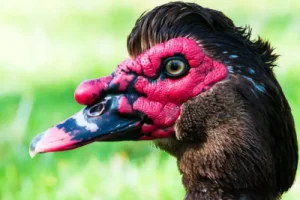
Muscovy ducks are the most popular duck breed with dark plumage.
They can live from 8 to 12 years on average in the wild, longer than larger breeds.
Domestic Muscovy ducks have a longer lifespan of 12 years.
Although Muscovy ducks are tropical birds, they can quickly adapt to cold climates and are less prone to illness.
Thus, they require less human care and can be raised with less feed and care costs.
2. Pekin (White) Ducks
Pekin ducks (or white ducks) can live from 5 to 10 years, while some can live up to 20 years.
Some people call Pekin ducks “yellow ducks” because they have yellow coats when they are babies, and these coats will fade to white color when they are getting older.
Since yellow ducks and white ducks are the same duck breed, they have the same lifecycle.
3. Indian Runner Ducks
When being kept domestically, Indian runner ducks can live up to 12 years.
However, in their natural environment, wild Indian runner ducks can only survive for just 1 to 2 years.
4. Mallard Ducks
Wild Mallard ducks have a life expectancy of 3 to 5 years.
But when being raised domestically and well-treated in a healthy environment (i.e. life on a duck farm), they can live up to 10 to 15 years like Pekin or call ducks.
5. Khaki Campbell Ducks
The maximum lifespan of a Khaki Campbell duck is 15 years. In general comparison, the average duck lifespan is between 8 to 10 years.
6. Call Ducks
Call ducks, a smaller breed than white ducks, can live from 7 to 10 years.
7. Bantam Ducks
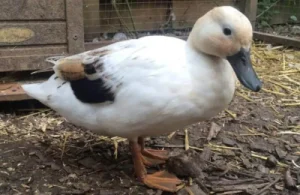
Bantam ducks have the longest life expectancy among all duck breeds.
In the bantam duck family, the two ornamental species of Black East Indies (or the East Indie) and the Calls have the most extended lifespan of up to 15 years.
There are two reasons for the extended lifespan of Bantam ducks.
First, they are thinner and grow slowly to stay young for a more extended period.
Males can remain active for a decade or more, while females can produce eggs for longer if they are well-fed and cared for.
Second, this duck breed maintains a healthy lifestyle throughout its life and does not often suffer from aging problems like other species.
8. Medium to Light Ducks
Medium to light ducks like Cayugas, Blue Swedish, or Runners have a longer lifespan of 10 to 13 years or 2 to 3 years than larger breeds.
9. Rouen ducks
Rouen ducks can live between 5 to 9 years.
This duck breed appeared in France before the 19th century and it looks similar to the Mallard duck but has a bulkier size.
Rouen ducks are raised mainly for decoration, exhibition, and meat production purposes. However, they are not raised for eggs because they are not as productive as other breeds.
Read More: How Big is a Duck Egg in Inches? In this guide, we discuss the average size and weight of duck eggs compared to chicken eggs!
Impressive Records of Duck Lifespans
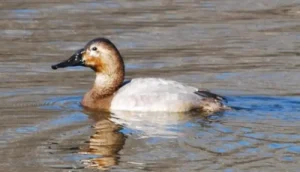
Apart from the above common breeds, some notable records of duck breeds with the longest lifespan, both domestic and wild, were collected by the Bird Banding Laboratory in Laurel, Maryland.
- Canvasback: 29 years and 6 months
- Ring-necked duck: 26 years and 5 months
- Black duck: 26 years and 5 months
- Blue-winged teal: 23 years and 3 months
- Wood duck: 22 years and 6 months
- Northern pintail: 22 years and 3 months
- American wigeon: 20 years and 11 months
- Green-winged teal: 20 years and 3 months
What Affects A Duck’s Lifespan?
After knowing how long ducks live in captivity and their natural environments, you might wonder how to make their lives last longer.
There are some essential factors that play a vital part in a domestic duck’s lifespan. As a duck owner, fully acknowledging these factors will help you provide proper care to extend the life of your duck.
Nutrition
To make the average lifespan of a duck longer, you should maintain a well-balanced diet for them. In other words, you should know what and when to feed them.
Ducklings (or baby ducks) should be fed duck starter foods that contain 20-22% protein for the first 2 weeks.
When they are two weeks old to 1 month old, they can switch to the grower with extra nutrients and 15-16% protein for fast growth.
When they reach 18 weeks old, you can switch to a low-protein diet (or regular layer feed) to keep them thriving without excessive weight gain.
Also, ensure that they always have an adequate supply of fresh green vegetation.
Luckily, ducks can clear up unwanted weeds on your farm or backyard if you let them play there.
You can also provide them with vegetable peelings or plants if they mainly live in captivity or when you don’t have any grassy areas nearby.
Likewise, grit – or small sands – is vital to ducks’ digestive system and helps them digest food easier
Finally, ducks drink a lot and love playing in the water. Thus, make sure you provide them with clean and fresh water at least twice daily.
You should also store water in a deep container to submerge their whole heads into the water.
Read our related article, How Much Does a Duck Weigh in Pounds? Here’s the average weight of ducks and the conditions that determine weight!
Housing And Protection
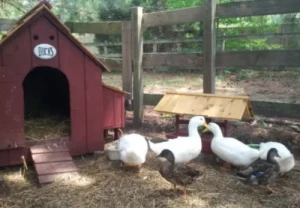
If you want your domestic ducks to live longer, you should ensure that these animals have safe and comfortable housing for them, depending on your location or local weather conditions.
Ducks often huddle together when sleeping, so their house should be spacious enough for 4 to 6 ducks sleeping and should be approximately 12 to 18 square feet (around 3.6 to 5.5 square meters).
If their housing has doors on one side, make sure they are closed from the wind direction and that all doors are able to close in bad weather.
Another threat to your ducks is their predators, especially foxes.
Since foxes can dig under fencing or chew through thin wood panels, make sure that you reinforce their housing to keep them away from these wild animals.
Last but not least, you should clean your ducks’ housing frequently. Clean accommodation keeps illness away from ducks and prevents the infestations of pests and harmful insects, ultimately prolonging the duck life span .
General Wellbeing
Ducks are highly social animals. Thus, besides food, water, and shelter, you should maintain a well-socialized environment to enhance their life quality.
Ducks should interact with other ducks to keep them happy all day.
If you keep them in a pen or a coop, you should move them around to enjoy fresh grass and have a new scene every day. These changes are vital to their physical and mental health.
Regular health check-ups and appropriate medical treatments from your veterinarian are some ways to extend your ducks’ life expectancy.
You can add supplements to their food and water to prevent them from diseases. However, remember to ask for your veterinarian’s advice before offering them any supplements.
Read More: What is a Male Mallard Duck Called? for a complete guide to male ducks, their proper name, and the difference between male and female ducks!
FAQs
1. How long do ducks live in the wild?
Wild ducks have shorter life spans than domestic ones because they are closer to predators and unhealthy conditions.
For example, sea ducks can only live for 7 years because they have high exposure to their predators and lack vegetation in their area.
2. How long do ducks live as pets?
Ducks can live from 10 to 15 years as domestic ducks, making them ideal pets if you have a garden or an expansive outdoor area. They are also inexpensive, hardy, and easy to take care of.
3. Can a duck live 20 years?
While almost all ducks can live up to 15 years, several can live up to 20 years.
For example, Ernie in the UK lived for 21 years and Edwina lived for 22 years. The oldest duck in the world is a canvasback, recorded at its ripe age of 29.
4. What type of duck lives the longest?
The Bantam duck is the duck breed that has the longest life expectancy, living up to 15 years.
Read More: How to Pick Up a Pet Duck. Picking your ducks up properly can prevent accidental injury, and it’s a lot easier than you may think!
5. How can you tell a ducks age?
Duckings are the easiest to determine age. If they are still fuzzy with no feathers, they are less than 3 weeks old.
If they have some feathers, they are about 3 to 5 weeks of age.
And ducks that are fully feathered are about 6 weeks old. After that, you can look at their feathers closer to see if they are pointed or rounded.
Pointed feathers are indicators that your duck is mature, whereas rounded feathers indicate immature birds.
6. Do ducks mate for life?
Do ducks keep the same mate for life? While some ducks do mate for life, most ducks form new bonds each season and participate in what is considered seasonal monogamy.
Final Words
Besides natural elements and their breed, please be aware that ducks’ lives also depend on housing, nutrition plan, and physical and mental health.
If you are a farmer, knowing how long ducks live and how to extend their lifespan will help you decide which duck breed you want to raise and how to extend their lifespan for more profit and meat/egg quality.
